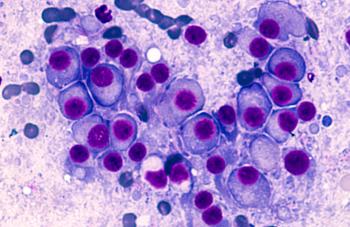
At a session of the European Hematology Association 2024 Congress, presenters shared updates from trials of treatment strategies for newly diagnosed multiple myeloma (MM).

Christina is the associate editorial director of The American Journal of Managed Care® (AJMC®) and Population Health, Equity & Outcomes, and joined AJMC in 2016. She oversees the publication of the print journals, from manuscript submission to publication, and works with the editors in chief and editorial boards to promote the journals.
She has a BS in public health from Rutgers University. You can connect with Christina on LinkedIn.

At a session of the European Hematology Association 2024 Congress, presenters shared updates from trials of treatment strategies for newly diagnosed multiple myeloma (MM).

At a friendly debate held at the European Hematology Association 2024 Congress, hemophilia experts argued for and against wider access to gene therapy for patients living with the condition.

Abstracts presented at the 2024 European Hematology Association Congress deliver results on regimens involving venetoclax for chronic lymphocytic leukemia (CLL).

Results presented at the 2024 European Hematology Association Congress suggest that chimeric antigen receptor (CAR) T-cell therapy can be feasibly and safely delivered in the outpatient setting as treatment for lymphoma.

At a YoungEHA session at the 2024 European Hematology Association (EHA) Congress, speakers discussed the prevalence of waste in laboratories, research, and clinical practice, as well as ways attendees can effect change for a more sustainable future.

A real-world report showed the safety and efficacy of zanubrutinib after a community oncology practice replaced ibrutinib with the newer Bruton tyrosine kinase inhibitor on its formulary.

The 2024 European Hematology Association (EHA) Congress, convening virtually and in Madrid, Spain, from June 13-16, 2024, will feature practice-changing findings in hematology and oncology, as well as ample networking opportunities and conversations about the future of the field.

At the spring conference of the New Jersey Health Care Quality Institute, speakers discussed how health policy, affordability, and transparency may play a role in voters’ decisions.

A cost-utility analysis conducted from the perspective of the Italian health system found that pegcetacoplan was more effective and less costly than 2 complement 5 (C5) inhibitors for the treatment of paroxysmal nocturnal hemoglobinuria (PNH).

By prioritizing well-being, both the public and private sectors can come together in partnerships to address social needs and social determinants of health.

As CMS’ suite of value-based and accountable care models evolves, leaders from across the agency detailed how they are working together to streamline quality reporting and encourage the move to a population health mindset while addressing providers’ concerns.

Results presented at the National Community Oncology Dispensing Association International Spring Forum describe meaningful improvements in functioning among patients who received the oral gamma secretase inhibitor to treat progressing desmoid tumors.

A review explores the evidence supporting the use of circulating tumor DNA (ctDNA) liquid biopsies to help direct the evaluation and management of EGFR-mutated non–small cell lung cancer (NSCLC), including for assessing resistance to certain treatment options.

After years of efforts to reduce low-value care, panelists at the 2024 Value-Based Insurance Design Summit proposed a new strategy: drawing a line in the sand that payers will not be on the hook for these services.

During a session of the 2024 V-BID Summit, panelists Stacie Dusetzina, PhD, and Inma Hernandez, PharmD, PhD, discussed how access to essential medications is curtailed not just by the longstanding complexities of insurance design but also by emerging threats such as supply chain weaknesses and cyberattacks.

Study findings show that scores on the Psoriasis Area and Severity Index and the Dermatology Quality of Life Index are correlated in patients with psoriasis across several continents, but factors affecting each of these scores are different across countries.

The FDA added another indication for semaglutide (Wegovy), expanding its use to reduce the risk of cardiovascular death, heart attack, or stroke in adults who have cardiovascular disease (CVD) and overweight or obesity.

A provision in the Inflation Reduction Act will implement a $2000 out-of-pocket cap on Medicare beneficiaries’ prescription drug spending, which could save money for more than 1 million enrollees when it takes effect next year.

Four years after the publication of data showing that the Camden Coalition’s “hotspotting” care management program did not reduce hospital readmissions, the investigators have published new work delving into the mechanisms behind the null findings.
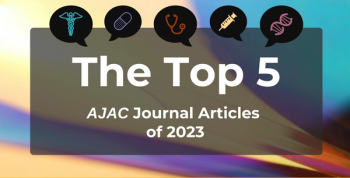
In 2023, the most-read articles published in The American Journal of Accountable Care® (AJAC) highlighted innovative care models, lessons learned from health system partnerships, and much more.

The editors in chief of The American Journal of Managed Care® discuss the managed care developments of 2023 and anticipate trends on the horizon.
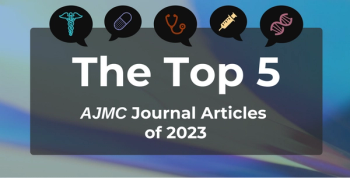
In 2023, the most-read articles published in the peer-reviewed The American Journal of Managed Care® (AJMC®) explored predictive models, opioid prescribing, and much more.

A new report from AHIP shows that Medicare Advantage outperformed traditional Medicare on several clinical quality measures, including preventive screenings. However, debate continues over these plans’ cost efficiency and impact on the financial sustainability of rural hospitals.
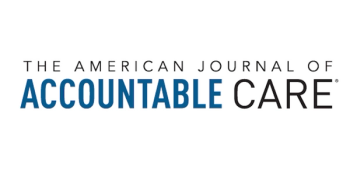
Health care providers and policy experts gathered in New Orleans, Louisiana, to discuss the complex interplay between food insecurity and obesity as well as the expanding toolbox of options to support patients in achieving a healthy weight.

Clinicians and leaders from Duke University convened in Durham, North Carolina, to discuss unmet needs in the care of patients with diabetes and opportunities to close those gaps through coordination, education, support, and technology.

After recent policy changes removing most medical debts from credit reports, Americans are seeing their credit scores increase, but experts warn of the need to monitor billing and collection practices for unintended consequences.
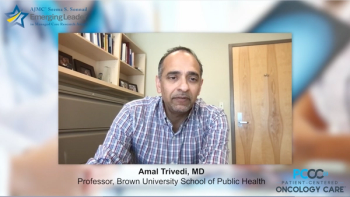
Amal Trivedi, MD, MPH, professor at Brown University, discusses the qualities that led him to nominate David J. Meyers, PhD, to receive the Seema S. Sonnad Emerging Leader in Managed Care Research Award. The American Journal of Managed Care® presented the award to Dr Meyers at the 2023 Patient-Centered Oncology Care® meeting.

Half of the surveyed adults reported difficulty affording their health care, and a large proportion said they delayed or avoided care or medication because they couldn’t afford it, often leading to their health problems worsening.

A 5-year randomized trial showed that the Million Hearts Model, which paid health care organizations to monitor and reduce cardiovascular disease (CVD) risk, was effective in reducing first-time heart attacks and strokes without associated increases in Medicare spending.

Vast claims databases can yield valuable information about the unmet medical needs of patients with chronic obstructive pulmonary disease (COPD) and severe asthma, and those insights point to areas that can be improved by engaging and educating clinicians.

259 Prospect Plains Rd, Bldg H
Cranbury, NJ 08512
© 2025 MJH Life Sciences®
All rights reserved.
